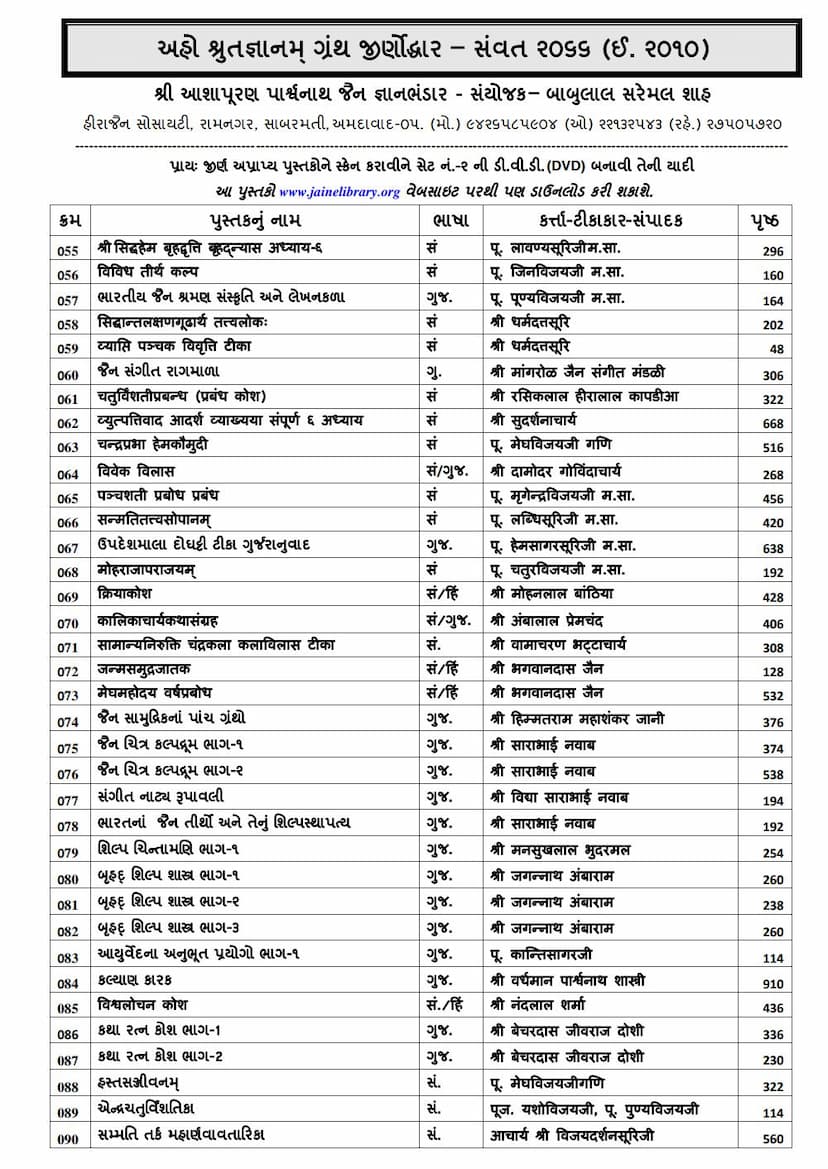Janmasamudra Jataka
Added to library: September 2, 2025

Summary
This comprehensive summary is based on the provided Jain text, focusing on the book "Janmasamudra Jataka" by Bhagwandas Jain. The text is a detailed astrological treatise covering various aspects of life from birth to death, with a strong emphasis on Jain philosophy and principles.
Book Title: Janmasamudra Jataka Author: Bhagwandas Jain (Hindi translation) Original Author: Narachandropadhyaya Publisher: Vishaporwal Aradhana Bhavan Jain Sangh Bharuch Catalog Link: https://jainqq.org/explore/009531/1
Overview:
The "Janmasamudra Jataka," originally composed by Narachandropadhyaya of the Kaashahradgachchha lineage in Vikram Samvat 1323 (1266 CE), is a significant Jain astrological text. The provided edition is a Hindi translation and publication effort, aiming to make this ancient knowledge accessible to a wider audience. The book delves into predictive astrology, known as "Hora Shastra" in Indian tradition, providing insights into an individual's life based on their birth chart. The title "Janmasamudra" translates to "Ocean of Birth," reflecting the vast and deep knowledge of life's predictions contained within the text.
Key Themes and Content:
The book is structured into eight "Kallolas" (chapters or sections), each exploring specific aspects of life and their astrological interpretations. The overarching theme is to understand the karmic influences on an individual's destiny and to provide guidance for spiritual and material well-being.
Chapter Breakdown (Based on the provided text excerpts):
-
Chapter 1 (Garbhasambhavadi Lakshana - Conception and Early Life): This section likely deals with the astrological indications of conception, the development of the fetus, potential complications during pregnancy, and the auspiciousness of birth. It might also cover topics like the gender of the child and the well-being of the mother.
-
Chapter 2 (Janma Vidhi - Birth Rituals and Circumstances): This chapter focuses on the circumstances surrounding birth, including the presence and position of parents, the nature of the birthplace (e.g., house, water, prison), the impact of celestial events on the birth, and the significance of different birth scenarios.
-
Chapter 3 (Rishtabhang Lakshana - Overcoming Afflictions): This crucial chapter addresses the concept of "Rishta" (afflictions or inauspicious yogas) in the birth chart. It provides astrological remedies and combinations that can mitigate or nullify negative influences, leading to a more favorable destiny. This aligns with the Jain emphasis on effort and the potential for positive transformation through knowledge and practice.
-
Chapter 4 (Mrityu Yoga Lakshana - Fated Death and Its Circumstances): This section delves into the predictions related to the manner and circumstances of death, such as death by fire, water, weapons, imprisonment, illness, or natural causes, all based on astrological configurations. It also likely discusses the possible afterlife destinations based on the karmic influences.
-
Chapter 5 (Dravyoparjan Rajayoga Lakshana - Wealth Acquisition and Royal Fortunes): This chapter is dedicated to the astrological indicators for wealth accumulation and attainment of high status or royalty. It explores various "Rajayogas" (planetary combinations leading to kingship or high office) and discusses the professions and sources of income indicated by the birth chart.
-
Chapter 6 (Jata Swarupa Lakshana - Characteristics of the Individual): This section likely details the personality traits, physical characteristics, disposition, and potential afflictions of the individual based on their birth chart. It might cover topics like longevity, health issues, and mental disposition.
-
Chapter 7 (Strijataka - Female Astrology): This chapter specifically addresses the astrological interpretations for women, focusing on their marital life, potential for widowhood, the characteristics of their husbands, and their maternal or overall familial influences.
-
Chapter 8 (Nabh Loka Yoga, Deeksha Yoga, etc. - Destinies and Spiritual Paths): This final section appears to cover a variety of advanced astrological concepts, including yogas related to spiritual pursuits ("Deeksha Yoga"), celestial configurations influencing one's ultimate destination ("Lok"), and various planetary combinations that determine one's destiny. It might also include longevity predictions and other complex astrological analyses.
Author and Publisher:
The Hindi translation and publication of this ancient text were facilitated by Bhagwandas Jain. The publisher, Vishaporwal Aradhana Bhavan Jain Sangh Bharuch, and the supporting institutions like Shri Ashapooran Parshwanath Jain Gyanbhandar in Ahmedabad, highlight a dedicated effort to preserve and disseminate Jain scriptural knowledge. The text also acknowledges financial contributors, emphasizing the community's role in such endeavors.
Philosophical Underpinnings:
The "Janmasamudra Jataka" is presented within the framework of Jainism. The preface emphasizes the role of ancient Jain scholars in contributing to various fields of knowledge, including astrology. It also touches upon the Jain perspective on science and the universe, questioning modern scientific claims and advocating for a deeper study of scriptural knowledge. The emphasis on understanding karma and the possibility of mitigating negative influences through knowledge and right action (as suggested by the "Rishtabhang" chapter) reflects the core tenets of Jain philosophy.
Significance:
This work is valuable for its contribution to the understanding of historical Jain astrological practices and its attempt to bridge ancient wisdom with contemporary accessibility. It serves as a testament to the rich intellectual heritage of Jainism and its commitment to providing guidance for a meaningful life.
In essence, the "Janmasamudra Jataka" is a comprehensive astrological guide rooted in Jain teachings, offering predictions and insights into various facets of human life, with a particular focus on the spiritual and ethical dimensions of destiny.